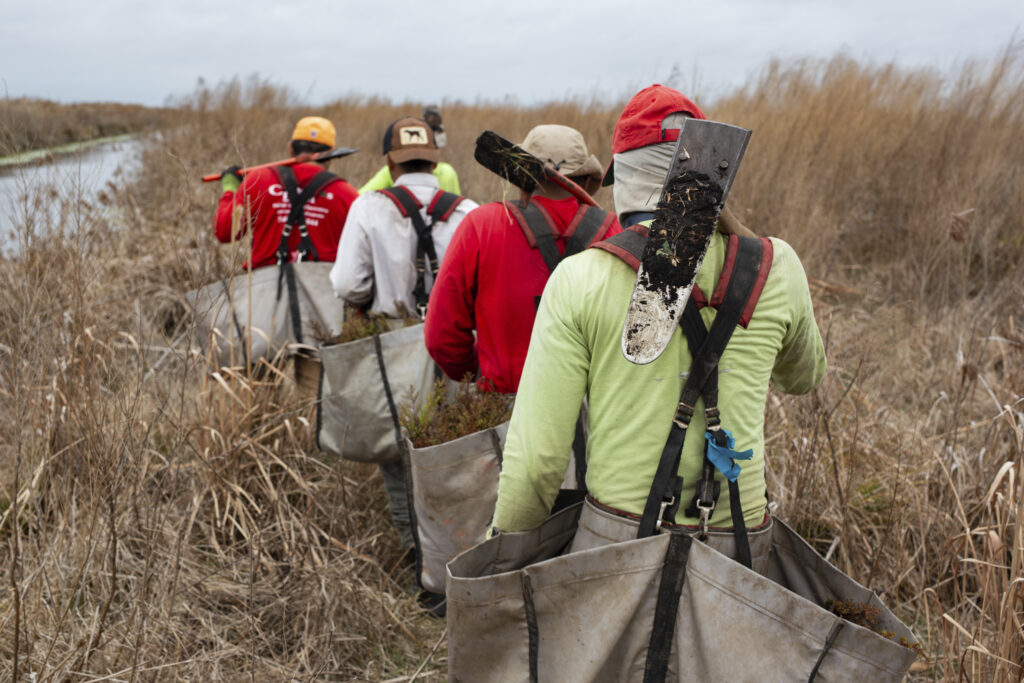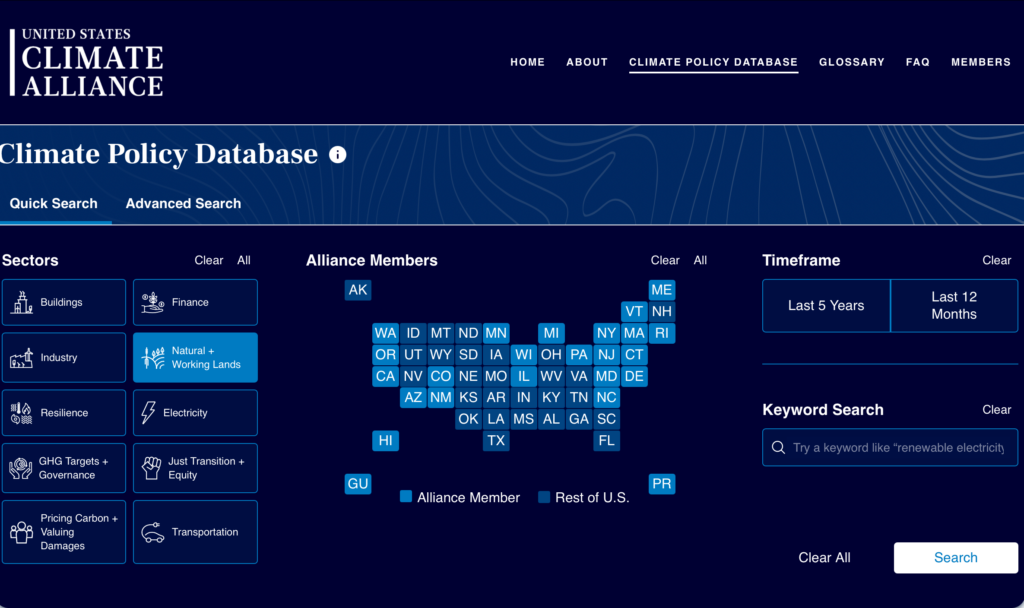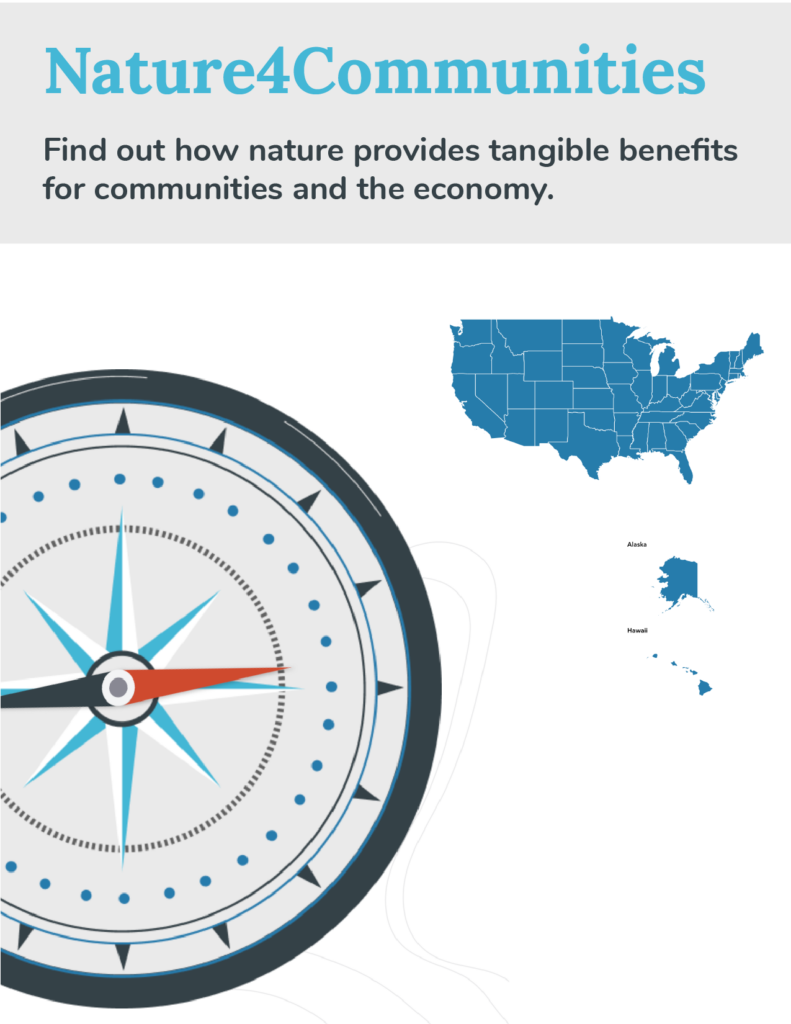Introduction
Natural Climate Solutions, also called Nature-Based Solutions, are actions that reduce emissions and increase carbon storage in forests, farms, grasslands and wetlands, while providing a host of additional benefits for people and the environment.
Practices that could be included are actions like encouraging farming techniques that retain carbon in the soil, such as planting cover crops; conserving and replanting forests; conserving and restoring coastal wetlands; and reducing the loss of natural areas, planting trees, and providing parks in communities.
Not only do these efforts help address climate change – they can improve water quality, prevent natural disasters like wildfire, drought, and flooding, protect wildlife habitat, and provide opportunities for hiking and fishing. Best of all, these solutions are cost effective, and can often improve local economies.
Below you can explore how people in North Carolina are benefiting from implementing nature-based solutions in their community through a diverse set of resources from USN4C members and others, including blog articles, videos, comprehensive reports, and more.
Co-Benefits Research for North Carolina
Blog Articles


Caroline Brehman/Getty Images for Pew
Pew Charitable Trusts Article: How the Pentagon and Partners are Working Together to Combat Climate Change


Soil Health Institute Fact Sheet: Economics of Soil Health Management on Five Cotton Farms In North Carolina


Photo by John Bliven
U.S. Nature4Climate/The Nature Conservancy Article: Saving North Carolina’s Peatlands
- The Nature Conservancy Article: Preserving Our Lands – Mountains, wetlands, sandy coasts and longleaf pine forests—North Carolina’s lands are our home.
- National Association of Conservation Districts Article: Duplin County SWCD Builds Local Conservation Team with TA Grants
Forests:
- The Nature Conservancy Article: The Future Forest: The Appalachians face multiple threats. Scientists are working to boost their adaptability.
- The Nature Conservancy Article: Western North Carolinians’ Health Depends on Healthy Forests
- American Forests Article: Reviving longleaf pine: A critical habitat for southeast wildlife
- The Nature Conservancy Article: Longleaf Pine Forests—A Tree for Our Time
- The Nature Conservancy Article: Pine Country: Bringing Back Longleaf Pine Forests
- SCIENCE: Geoplatform.Gov (U.S. Geological Survey): Modeling and Mapping Burn Severity of Prescribed and Wildfires Across the Southeastern United States (2000-2022)
- National Wildlife Federation Article: Nature-Based Solutions Needed to Combat Appalachia’s Growing Flood Risks
- USDA Forest Service Fact Sheet: Forest Legacy 2024 Funded Projects
- National Association of Conservation Districts Press Release: NACD Announces Urban and Community Conservation Grants for 35 Recipients
- Pew Charitable Trusts Article: The Era of Extreme Heat Is Here: Federal and State Governments Roll Out Strategies to Cope
- American Forest Foundation Article: Family Forest Carbon Program Expands Availability in the Southeast
- The Nature Conservancy Press Release: Controlled Burn Season Beginning in Longleaf Land
Agriculture:
- The Nature Conservancy Article: The Martins Understand the Challenges Small-Scale Farmers Face. The Farm Bill Could Provide a Path Forward.
- SCIENCE: Carbon Balance and Management Study (Conservation International): Maximizing Tree Carbon in Croplands and Grazing Lands While Sustaining Yields
- SCIENCE: Soil Health Institute Article: Maximizing Weed Suppression with Cover Crops in Cotton Production
- Soil Health Institute Fact Sheet: Using Cover Crops as a Weed Suppression Tool in Cotton Production
- Soil Health Institute Fact Sheet: Cover Crop Species Comparison for Weed Suppression in Cotton Production
Coastal Wetlands:
- Theodore Roosevelt Conservation Partnership Nature-based Solutions Interactive Map: North Carolina – Pocosin Wetlands Restoration and Wildfire Prevention
- U.S. Nature4Climate Blog Article: A First-of-Its-Kind Seagrass Inventory Is Helping to Drive Climate Action in North Carolina
- The Nature Conservancy Article: Saving North Carolina’s Peatlands
- U.S. Nature4Climate Blog Article: Tapping into the Potential of Blue Carbon: A Natural Solution to Climate Change and Coastal Resilience
- Pew Charitable Trusts Article: States Improve How They Assess Coastal Wetlands’ Impacts to Reduce Climate Pollution
- The Nature Conservancy Press Release: NOAA Announces $220 Million for Coastal Conservation and Restoration Projects
- Pew Charitable Trusts Article: States Harness Coastal Wetlands to Meet Climate Goals
- Pew Charitable Trusts Article: Change in Federal Protections for Wetlands Poses Resilience Challenge for States
- U.S. Nature4Climate/Pew Charitable Trusts Blog Article: Carbon Captured by Coastal & Ocean Habitats Can Advance States’ Climate Goals: Experts discuss growing ‘blue carbon’ data and resources, and their potential role in policy
- U.S. Nature4Climate/Pew Charitable Trusts Blog Article: Salt Marsh Conservation on the Atlantic Coast – Where Blue Carbon Supports Diverse Partnership
Reports
Videos & Podcasts
The Nature Conservancy Video: Harvesting Hope: Sowing Seeds of Change on the Martin Family Farm
Explore More!

A new national survey conducted by U.S. Nature4Climate shows that voters across party lines support natural climate solutions more than ever, suggesting fertile ground for bi-partisan cooperation and consensus-building, opening up new avenues for climate action. Learn more.

Explore U.S. Climate Alliance‘s Climate Policy Database.

Explore Nature4Communities, a resource that shows you how nature-based solutions are critical for your community’s well-being and become a better advocate for their implementation.
